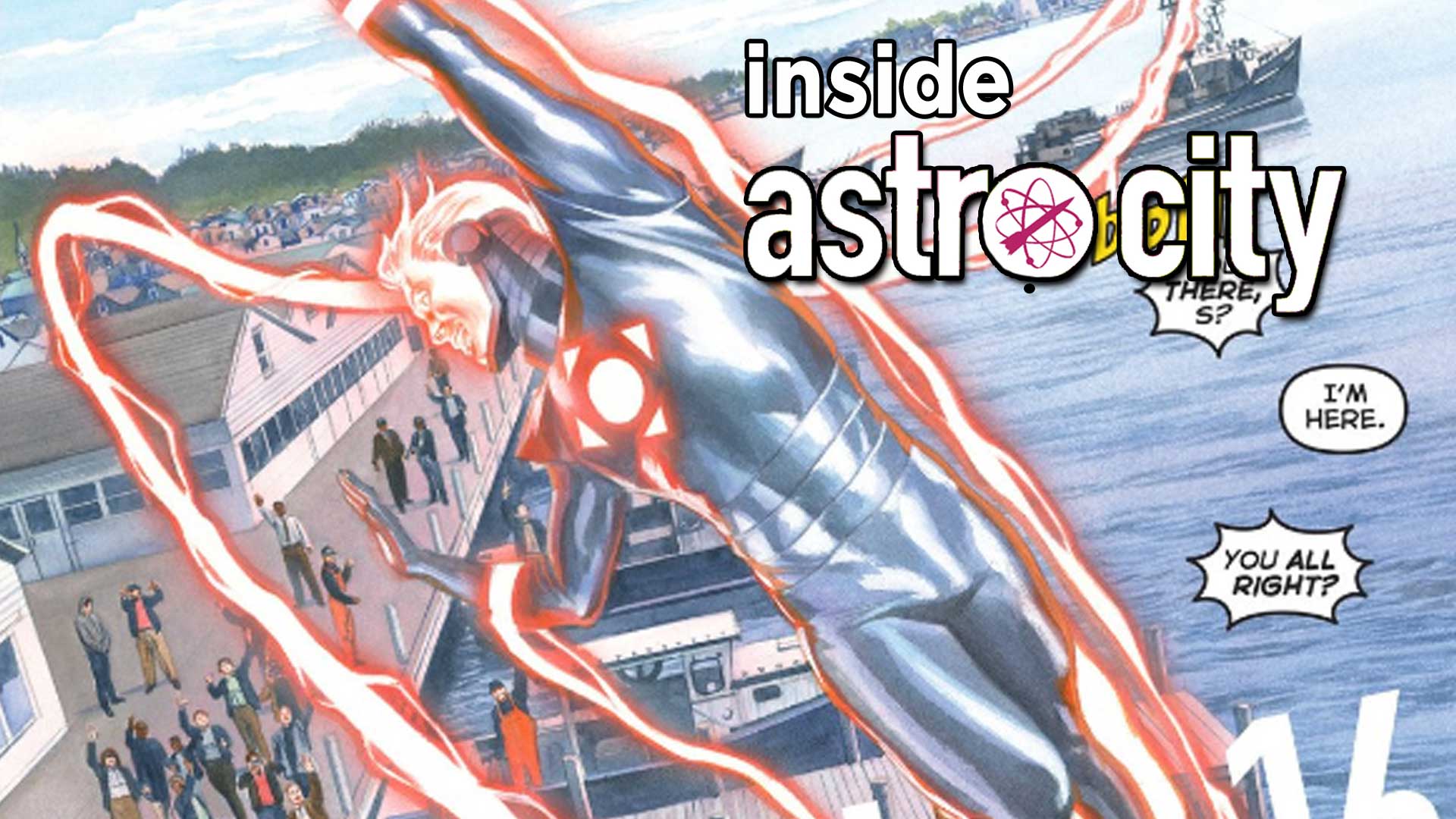Welcome to Inside Astro City, a column focusing on the Vertigo Comics series Astro City from Kurt Busiek, Brent Anderson, and Alex Ross. Each month, we’ll take a look at the current issue of the series, and ask series writer Kurt Busiek questions about the book. Let’s jump into issue 16!
This is a spoiler-filled column, so if you have not yet read the issue you might want to come back later. You can find the issue at your local comic book shop or you can download it from Comixology here.
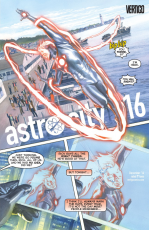 Astro City #16: Once upon a time, in a small, idyllic town, there was a teen super hero named Starbright. But “once” was a long time ago. Find out what became of Starbright and his greatest foe, and what their entwined destinies hold for the future.
Astro City #16: Once upon a time, in a small, idyllic town, there was a teen super hero named Starbright. But “once” was a long time ago. Find out what became of Starbright and his greatest foe, and what their entwined destinies hold for the future.
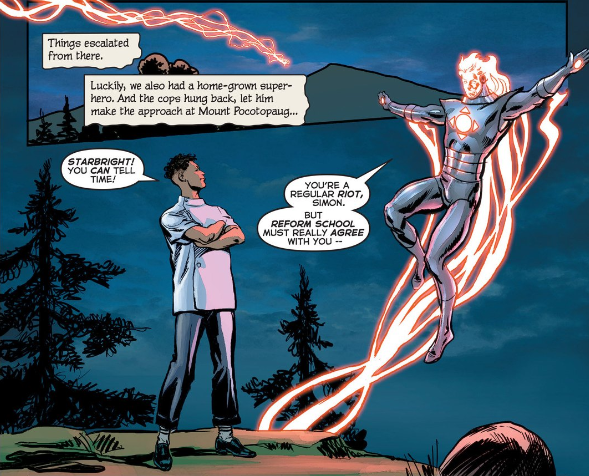
1. You reveal in the letter column of this week’s issue that the story for this issue came from a 1982 script called “The 24-Hour Truce of Lex Luthor.” Can you remember back to 1982 and tell us what excited you to write a story about the hero and the villain working together for the same goal?
Kurt Busiek: I don’t think it was the idea of the hero and villain working together that was what interested me, so much — it’s pretty much the most perfunctory part of that 1982 script. What I remember about it, these many years later, is that I was looking for ideas for stories I could tell set during Superman’s college years. I’d had my 18th birthday during my first month at college, away from home and from most of my old friends, so I wondered what Superman’s 18th birthday would have been like.
Then I quickly realized that there was likely no way anyone would let me write the story of Superman’s 18th birthday, not as a newcomer — and besides, I think his birthday has been established as in the spring sometime, so he’d have turned 18 while still at Smallville High. But what about Lex?
Thinking about Lex Luthor’s birthday made me think about him being lonely, about outwardly insisting he didn’t need the company of others but inwardly needing it just the same. And about Superboy always wanting to reform Lex, to fix the mistake that sent him down the wrong path. That felt like there was a story there. And it was in thinking about that — the idea that Lex wants a party, so he’d somehow force or trick or bargain Superboy into throwing him one — that made me figure Lex would offer to team up with Superboy to solve crimes for a day, and that he’d be really, really good at it. But in the end, they’re not working toward the same goal: Superboy wants to stop crime and he wants to reform Lex. But Lex’s goal is the party.
That was something I got to deepen and build on in reworking the characters and turning it into an ASTRO CITY story.
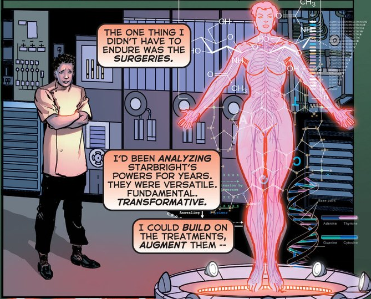
2. Would you say that issue sixteen’s main theme is “identity?” Especially since the main villain, Simon Says, is a transgender character who becomes a hero?
KB: “Identity” works, well enough. To the extent that I’d thought it out and discussed it with Alex and Brent, we were thinking it was more likely “transformation.” Simon is a trans woman, and recognizing that allows her to transform, not only physically, but from villain to hero. Starbright is a character who transforms, and in showing two faces to the world is able to inspire Simon’s transformation — and to provide the scientific means of it.
Simon’s questions over her new identity are questions of identity and of transformation. So I think they’re probably both in there.

3. When a storyteller puts a writer as a character in a story, I always have to ask, do you see any of yourself in that character? Are you and Rick similar? Or what germ led to the creation of that character?
KB: Sometimes when a writer puts a writer into a story, we’re just being lazy — it’s easier to use what’s right in front of you than to come up with another way to accomplish it. In this case, I had very little room to fit in much about Rick, and when Simon wants to move to Astro City, I wanted Rick to be willing to go along. So him being a writer and thus not tied to a job in a particular town was an easy way to deal with that in a single word balloon. I could have come up with something else, I suppose, but making him a novelist was easy, and allowed me to get the focus back on Simon and her transformation.
If and when we see Rick again, we may learn more about him.
But overall, I don’t see that much in Rick that’s like me, at least not yet. Where he came from is pretty simple, if indirect: In the original script, there was a character named Dave Hammond, who was one of Clark Kent’s college friends, maybe his roommate (I didn’t go back and check). Dave wasn’t all that interesting to me, as evidenced by the fact that I don’t remember much about him, so when I started thinking about reworking the script, I started thinking of him as Pete Ross, Superboy’s high school pal.
And I reworked him into Rick from there — he was someone who was a friend to Starbright, the hero, but who was also a friend to Simon, the villain, back when Simon had a semi-ordinary life. I put him in a wheelchair because it gave him something Simon could identify with — not the wheelchair, but simply that Rick, too, was an outsider by dint of being “different,” of being dismissed by the popular crowd. Plus, it gave me a hook that I could hang Simon’s assumption that Rick might have been Starbright on, that he was clearly coming from a place of understanding outsiderhood and that the wheelchair could be part of the transformation.
There’s a lot about Rick’s relationship with Simon that we don’t really know, because we’ve only had one issue and the story we were telling focused so much on Simon and Starbright. But what’s there is shaped by the story, its needs and its themes.
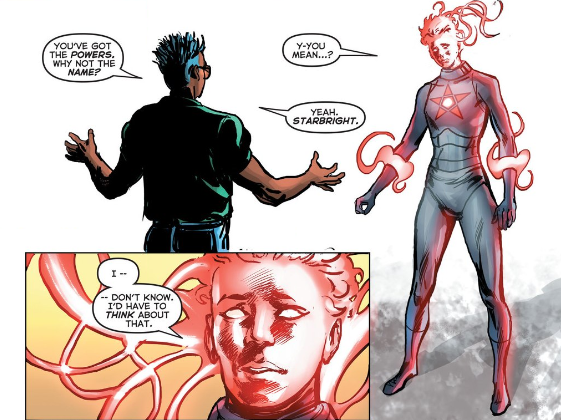
4. How does it feel to see this story in print after so many years?
KB: It’s very cool to see it become a reality, and we’ve been getting some great, heartfelt responses to it — not so much to it being an old, refurbished script, but to the story itself, and the transgender character. I take that as a compliment, that readers are taking it as is, and not reacting to what it was before — apparently, the core material that comes from the old script still works, as a story, as a piece of writing, even though I wrote it 32 years ago when I was just starting out. That part feels good.
Also, while the story got transformed itself, as thoroughly as its lead, the scenes that are closest to the scenes in the original script, notably the football scene and the scene where Starbright returns to Simon’s lair after the party’s over — seeing those drawn by Brent, seeing my imaginary images from so long ago become real, that was a blast.
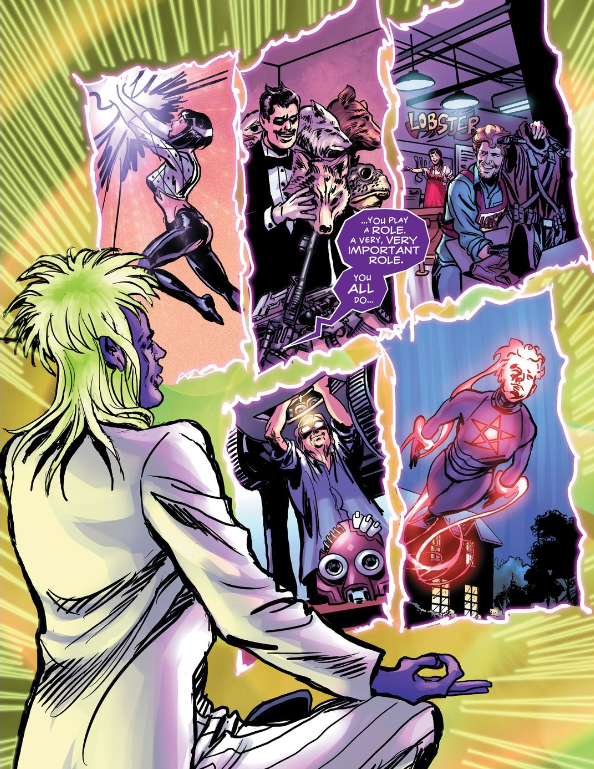
5. Can you give us any hints or teases about what the last page means for the future of Astro City?
KB: It gives a new complexion to why we told these particular stories as a set, doesn’t it?
The Broken Man’s quest to stop the Oubor — something he can’t do through the big established heroes, because the Oubor has already “gotten to” them, whatever that means, is at least beginning to take a shape. The Broken Man has something in mind for these five people, and wants them to play a role in his grander scheme. A sorceress, a couple of criminals (one reformed, one not so much), a reclusive robotics expert and a trans hero finding her way…a motley assemblage, but I think it’s fair to say you’ll be seeing them all again…
Though next time, you’ll be seeing the story of Krigari Ironhand, Honor Guard’s greatest (or at least most persistent) foe, what’s behind their decades-long series of clashes and why Honor Guard, once a year, gets a mysterious delivery of delicious alien crimson baked goods.
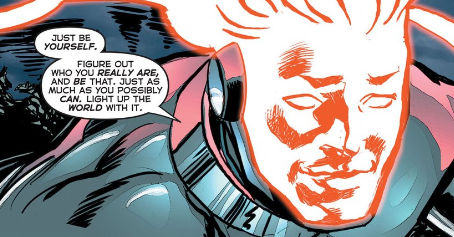
And that’s it! I hope you enjoyed this special look inside Astro City #16! A special thank you to Kurt Busiek for taking the time out of his busy schedule to answer our questions. If you haven’t had a chance to read Astro City, I highly recommend running down to your local shop and picking it up.
NEXT TIME
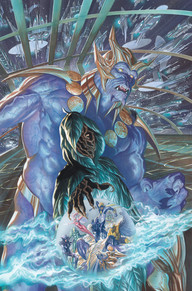
Astro City #17: Krigari Ironhand. Tyrant. Emperor. Interdimensional scourge. Honor Guard’s greatest enemy. His rise. His fall. The death of one of Honor Guard’s own. And the secret story behind it all. Featuring guest penciller Tom Grummett in a very human tale of obsession, cosmic battle and interstellar conquest.
 Astro City #16: Once upon a time, in a small, idyllic town, there was a teen super hero named Starbright. But “once” was a long time ago. Find out what became of Starbright and his greatest foe, and what their entwined destinies hold for the future.
Astro City #16: Once upon a time, in a small, idyllic town, there was a teen super hero named Starbright. But “once” was a long time ago. Find out what became of Starbright and his greatest foe, and what their entwined destinies hold for the future.


